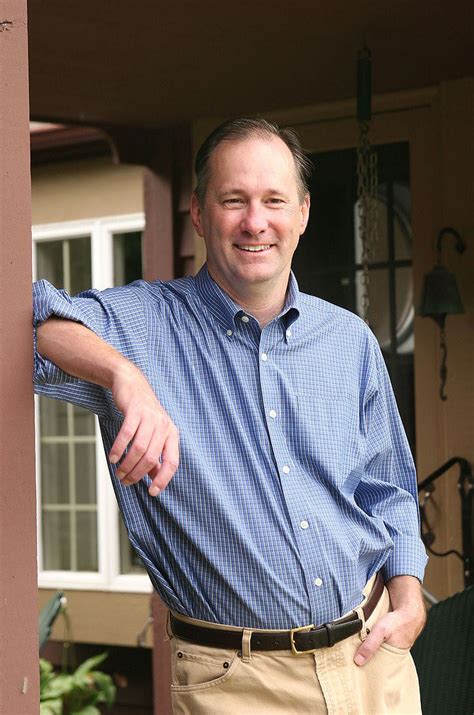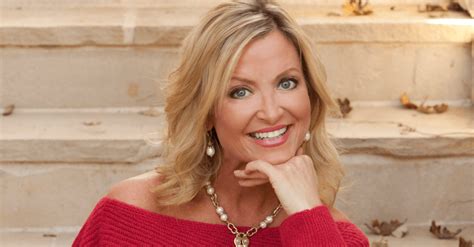A Quote by Mark Nepo
We often move away from pain, which is helpful only before being hurt. Once in pain, it seems the only way out is through. Like someone falling off a boat, struggling to stay above the water only makes things worse. We must accept we are there and settle enough so we can be carried by the deep. The willingness to do this is the genesis of faith, the giving over to currents larger than us. Even fallen leaves float in lakes, demonstrating how surrender can hold us up.
Quote Topics
Above
Accept
Away
Before
Being
Being Hurt
Boat
Carried
Currents
Deep
Demonstrating
Enough
Even
Faith
Fallen
Fallen Leaves
Falling
Falling Off
Float
Genesis
Giving
Helpful
Hold
How
Hurt
Lakes
Larger
Leaves
Like
Makes
Move
Must
Off
Often
Once
Only
Out
Over
Pain
Seems
Settle
Someone
Stay
Struggling
Surrender
Than
Things
Through
Up
Us
Water
Way
Which
Willingness
Worse
Related Quotes
Pain is a holy angel who shows us treasures that would otherwise remain forever hidden; through him men and women have become greater than through all the joys of the world. It must be so and I tell myself this in my present situation over and over again. The pain of suffering and of longing, which can often be felt even physically, must be there, and we cannot and need not talk it away. But it needs to be overcome every time, and thus there is an even holier angel than the one of pain; that is, the one of joy in God.
Consider, for example, lust versus love. When we lust after someone or something, we think in terms of what they (or it) can do for us. When we love, however, our thoughts are immersed in what we can give to someone else. Giving makes us feel good, so we do it happily. But when we lust, we only want to take. When someone we love is in pain, we feel pain. When someone whom we lust is in pain, we only think in terms of what that loss or inconvenience means to us.
Raw pain alarms. us. It reminds us that life isn't as orderly as we'd hoped. We demand that pain settle down before we shuffle it off to the quiet table. We want pain to stay in its own little section, want to keep it from spilling over into the other parts of life. Just like . lunch trays. Keep pain in its own little compartment.
It is only great pain--that slow, sustained pain that takes its time, in which we are, as it were, burned with smoldering green firewood--that forces us philosophers to sink to our ultimate profundity and to do away with all the trust, everything good-natured, veil-imposing, mild and middling, on which we may have previously based our humanity. I doubt that such a pain makes us 'better'--but I know that it makes us deeper.
Growing up is all about getting hurt. And then getting over it. You hurt. You recover. You move on. Odds are pretty good you're just going to get hurt again. But each time, you learn something. Each time you come out of it a little stronger, and at some point you realize there are more flavors of pain than coffee. Pain does two things: it teaches you, tells you that you're alive. Then it passes away and leaves you changed. And everything that will ever happen to you in life is going to involve it in one way or another.
I was trying to explain my situation to myself. My situation was that I was in pain and nobody knew it, even I had trouble knowing it. So I told myself, over and over, You are in pain. It was the only way I could get through to myself. I was demonstrating externally and irrefutably an inward condition.
How I saw in her my own true nature. What was beneath my skin. Inside my bones... Even though I was young, I could see the pain of the flesh and the worth of the pain. This is how a daughter honors her mother. It is shou so deep it is in your bones. The pain of the flesh is nothing. The pain you must forget. Because sometimes that is the only way to remember what is in your bones. You must peel off your skin, and that of your mother, and her mother before her. Until there is nothing. No scar, no skin, no flesh.
But we are gravely mistaken to think that Christianity protects us from the pain and agony of mortal existence. Christianity has always insisted that the cross we bear precedes the crown we wear. To be a Christian, one must take up his cross, with all of its difficulties and agonizing and tragedy-packed content, and carry it until that very cross leaves its marks upon us and redeems us to that more excellent way which comes only through suffering.
We aimed for no more than to have dominion over every creature that moved upon the earth. And so it came to pass that we stepped down there on a place we believed unformed, where only darkness moved on the face of the waters. Now you laugh, day and night, while you gnaw on my bones. But what else could we have thought? Only that it began and ended with us. What do we know, even now? Ask the children. Look at what they grew up to be. We can only speak of the things we carried with us, and the things we took away.
But pain may be a gift to us. Remember, after all, that pain is one of the ways we register in memory the things that vanish, that are taken away. We fix them in our minds forever by yearning, by pain, by crying out. Pain, the pain that seems unbearable at the time, is memory's first imprinting step, the cornerstone of the temple we erect inside us in memory of the dead. Pain is part of memory, and memory is a God-given gift.
All pain in life comes from wishing things were different than they are. Conversely, peace and happiness must come from accepting life as it is and breaking through the barriers of illusion to do so... All things that we label good or bad often hold in them surprises if we stay open. Each of us has choice in how we interpret life's events and in this way we are each responsible for our own reality.







































